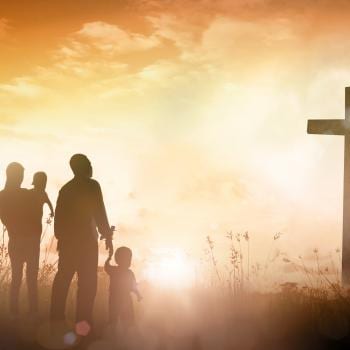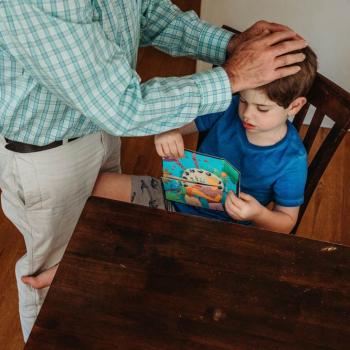In light of the upcoming Extraordinary Synod on the Family and the recent release of the working document on the Synod, the Patheos Catholic Channel is hosting a special symposium on the  Catholic vision of marriage and family life and the specific challenges to both living out and promoting that vision. In light of this effort, I wanted to kick off my contribution by looking briefly at why the family matters at all.
Catholic vision of marriage and family life and the specific challenges to both living out and promoting that vision. In light of this effort, I wanted to kick off my contribution by looking briefly at why the family matters at all.
More Than “‘Cause God Said So”
Many people know that the Church teaches that family (defined as one man married to one woman and the children produced by their exclusive union) is the basic unit of society. But even if you know this factoid, not a lot of people have necessarily stopped to consider why this is the case.
While some might, correctly, say, “Because that’s the way God intended it to be” that answer doesn’t cut a lot of ice with those who would dispute the idea that family should occupy the spot as the bedrock of society. Because of this, I actually spend a fair amount of time on this question with my students in my Christianity and Society course at Franciscan University. Because it is a sociology course, I challenge my students to defend various Church teachings using only logic and social science research rather than Scripture and revelation. Putting these limits on my students creates fertile ground for some interesting discussions. Seen from this perspective, the idea that the family is the basic unit of civilization is rooted in what it takes to create a just society.
What Makes Society Just?
In order for a society to be just, it has to be able to easily balance the rights of the individual with the greater good of the social group–the common good. A society that over-emphasizes the needs of the group often overlooks or crushes the rights of individuals. Obviously, that’s not healthy. Alternatively, societies that over-emphasize the rights of the individual tend to do a poor job both of attending to the needs of those on the margins of society and creating social structures that lead to the progress of a society as a whole. Also, not good.
A Just Society: Family Vs. Other Social Structures.
In a sense, the family is the smallest social unit that is capable of balancing the needs of both the individual and the social group. In families, individuals learn ways of asserting their rights in a manner that is consistent with the well-being of every other individual member and of the family group as a whole. Because of the size, the closeness, and the inherent interdependence that is part of family life, family is the ideal laboratory–much more than any other social unit–to learn the strengths and virtues that are essential for living a full, rich, and pro-social life. There simply isn’t any other social structure that’s equipped to do this as efficiently. This isn’t a theoretical discussion. There is plenty of historical data to support this idea. In fact, let’s look at how family stacks up in comparison to other social structures various civilizations have tried to place at the center of their life. Namely, the state, corporation, religions, and individuals.
The State
Civilizations that build society around the state instead of the family, such as fascist and communist countries, have shown that they simply are unable to attend to the rights of individuals, in general, or marginalized individuals, in particular. Communist and fascist regimes of the 20th century have shown themselves to be soul-crushing societies that eliminate any individual aims that do not serve the goals of the larger society.
The Corporation
History has also shown that societies that place the corporation at their center of society also tend to crush the needs of the individual and the family. When corporations are seen as the building block of society, the fruit of such civilizations tend to be company stores, low wages, and the sacrificing of family life, personal health and the well-being of anyone who can’t contribute to the bottom line.
Religion
You might think that, as religious people, Catholics would want religion to be the building block of society, but we recognize that when religions serve as the focal point of a civilization, the rights of the individual also suffer as religious freedoms (especially of those who are not co-religionists) and other personal freedoms are trampled. Such societies, as well meaning as they may be, tend to impose on people more than proposing to people.
The Individual
Finally, history shows that societies that place the individual at the center–despite pretentions to radical democracy–tend to, in reality, be anarchies or oligarchies that favor the “haves” over the “have-nots” and/or struggle to create infrastructures that enable them to grow beyond small tribal groups. In a society where individual needs are the greatest good, who settles disputes when individual needs conflict? Usually, the strongest and wealthiest prevail forcing the weak and poor to the margins.
Family and Social Welfare
You see a similar dynamic when it comes to meeting social needs. Of all the possible social structures, there is no organization like the family that is both as invested enough and flexible enough to meet the needs of suffering members. When families fail, it is tremendously expensive for any other social structure to even attempt to do half as good a job as a family can do meeting the needs of sick, poor, elderly, or otherwise struggling members.
The Supremacy of the Family
In short, there are very good reasons beyond Scripture and revelation why the family should be protected and promoted as the basic unit of civilization. It isn’t just a social construct. It is the bio-psycho-social basis for civilization. Family creates bonds that see to the health and well-being of both the individual members and the family group. It provides an environment that makes it possible to learn the lessons that are important to leading a meaningful life and interacting well with others. Even considering the very real problems that families face, there is simply no other social institution that is as flexible, resourceful, or as efficient at meeting the needs of individuals while simultaneously promoting the common good. For these and many other reasons, family deserves the title the Church has given it; “the building block of civilization” and it deserves to be protected by lawmakers and society as a whole.












